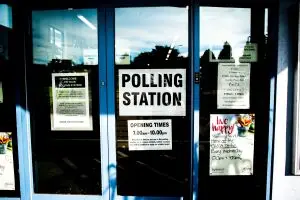The predominant question in UK politics currently is “when will the next general election be?”. A general election must take place by 28 January 2025. So, with a year left, speculation abounds on when voters will be asked to go to the polls. The eventual timing will have important implications for public affairs campaigns and organisations should be prepared.
When will the next general election be?
- A January 2025 election
The latest date Parliament can dissolve for a general election is on the fifth anniversary of the day it first met (17 December 2019) with the election taking place 25 working days later.[1] This would take us to 28 January 2025.
A January election appears very unlikely given neither political parties nor voters want to experience campaigning over the Christmas period. Indeed, the Prime Minister has previously ruled out 2025 telling journalists 2024 will be an ‘election year’.[2]
- Early election in May 2024
Recently, media attention has focussed on the possibility of an election in May 2024. Developments such as the introduction of a National Insurance Contribution (NIC) cut in January 2024[3], rather than the start of the tax year in April, and the Chancellor’s announcement over Christmas that the next Budget will occur on 6 March 2024[4] have prompted many to suggest the Government is eying up May. May would have the benefit of avoiding the potential baggage caused by poor local election results on 2 May and negative news concerning Channel boat crossings that typically occur during the summer months.
However, Rishi Sunak has now indicated that his ‘working assumption is that we’ll have a general election in the second half of this year’.[5] This option remains available to Sunak but with the Conservatives still trailing Labour in the polls and the Prime Minister only having been in post for 14 months, he is likely to hold off in the hope that economic fundamentals and polling improves.
- An election in Autumn 2024
An Autumn 2024 general election appears the most likely scenario. This option would afford the Government two more financial statements to announce popular measures, and allow them to be felt, ahead of polling day. Furthermore, most economic forecasts indicate an easing in economic pressures as time goes on.[6] Sunak could utilise his party conference as the springboard into the election campaign setting a polling date around 14 November, a week or so after the US election.
How is an election called?
The Prime Minister can decide when to call a general election before 17 December 2024. To call an election, the Prime Minister formally asks the monarch to dissolve Parliament. This is usually done in a visit to Buckingham Palace followed by an announcement on the steps of Downing Street. This marks the start of the ‘pre-election period’ or ‘purdah’ where government activity is restricted. Parliament is typically dissolved a few days later to allow for unfished parliamentary business to be completed.
How does the general election affect public affairs?
General elections concentrate minds and accelerate influencing processes. The Conservative government is seeking quick wins and Labour is open to workable manifesto ideas. The appetite for input is large but stakeholders’ ability to engage with proposals constricts as electoral focus takes precedent. As well as seeking to land new positions, organisations often need to guard against dramatic policy changes a change in government can cause. Furthermore, charities must comply with the Lobbying Act and most organisations wish to act carefully during the pre-election period. All these nuances must be balanced to successfully navigate the build-up, campaign and aftermath of a general election.
BREVIA CONSULTING PROVIDES STRAIGHTFORWARD POLITICAL ADVICE AND SUPPORT TO BUSINESSES AND ORGANISATIONS
Discover how Brevia can help you and your organisation by contacting the Brevia Team on 020 7091 1650 or contact@brevia.co.uk
[1] Legislation.gov.uk, Dissolution and Calling of Parliament Act 2022, link
[2] Evening Standard, When is the next UK general election? Sunak suggests second half of 2024, 4 January 2023, link
[3] HM Treasury, Autumn Statement 2023: National Insurance Factsheet, link
[4] HM Treasury, Spring Budget 2024 date confirmed, link
[5] BBC News, Rishi Sunak suggests general election in second half of year, 4 January 2024, link
[6] OBR, The outlook for household income and consumption, link




